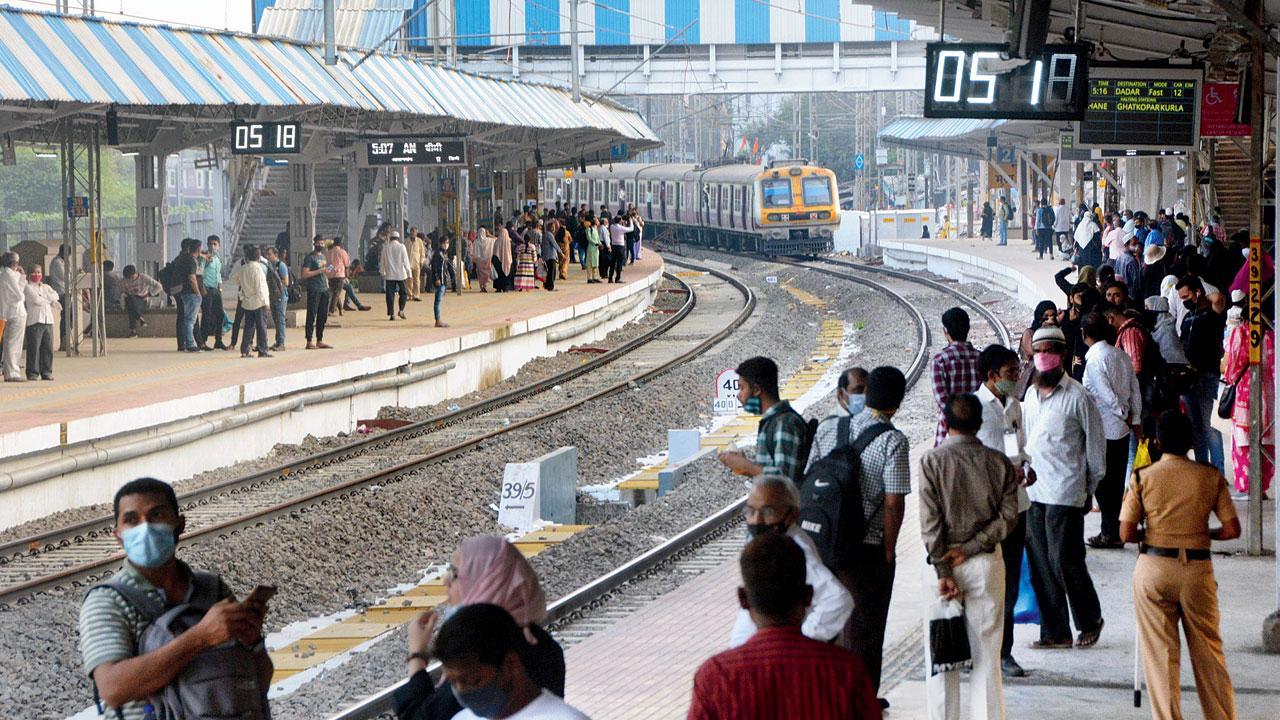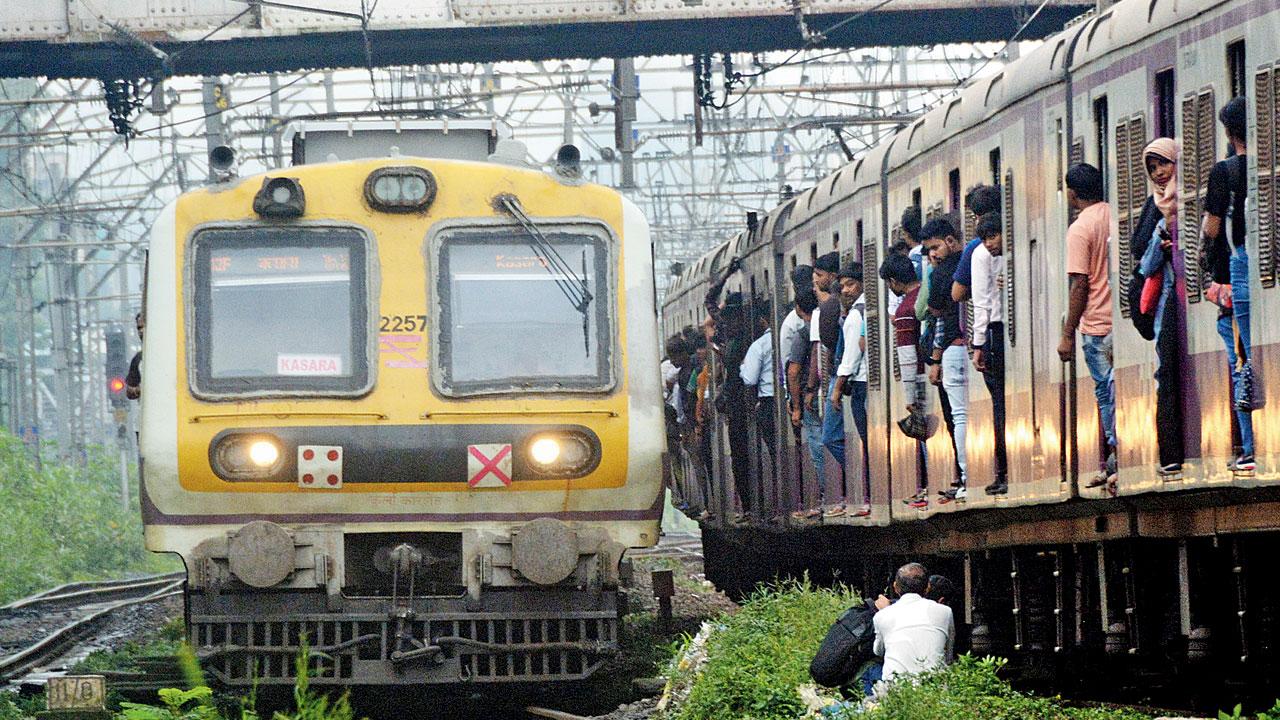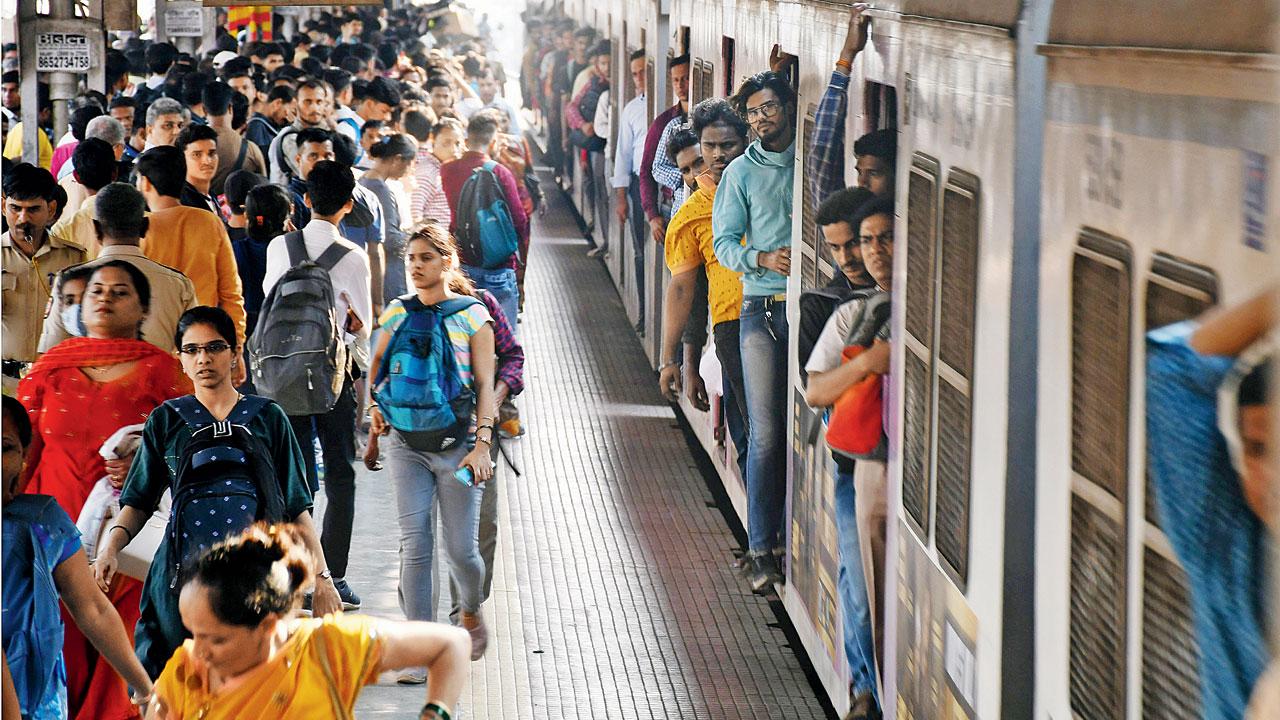With year-end figures showing that suburban train ridership is still 14.3 lakh lower than it was during pre-pandemic times, officials and experts say commuting trends might have irrevocably changed

Passengers wait at the platform in Thane, in 2022. Pic/Satej Shinde
The pre- and post-Covid figures of passengers availing the services of local trains are seeing a significant decline, almost 20 per cent a day. Compared to the financial year of 2019-2020, 14.39 lakh fewer commuters took the city’s lifeline daily in the fiscal ending March 2023. While commuters blamed the fall from 76.34 lakh a day in FY20 to 61.95 lakh a day in FY23 on ticketless passengers, experts attributed it to pandemic-induced remote work and changes in transport preference.
While the commuters blamed the fall from 76.34 lakh a day in FY20 to 61.95 lakh a day in FY23 on ticketless passengers, experts believed that remote work, new modes of transport and private vehicles have taken the load off local trains.

One of the experts blames deterioration in services for drop in passenger figures. Pic/Satej Shinde
According to the statistics of Central Railway (CR), on an average 41.47 lakh people travelled via local trains daily in FY20 and the figure dropped by 6.09 lakh to 35.38 lakh in FY23. Western Railway (WR) ferried 34.87 lakh commuters daily in FY20, but the number of passengers declined by 8.30 lakh to 26.57 lakh in FY23. Overall, CR and WR combined saw a daily decline of 14.39 lakh commuters. The numbers are calculated on the basis of ticket sales, revenue and average footfalls of passengers at stations.
Ticketless passengers?
Many commuters mid-day spoke to were sceptical of the figures. Given the crowds in the trains, the passenger numbers seem to have gone back to the pre-Covid times, they said. “The [official] numbers are all hogwash. Come and look at the crowds in trains; one cannot get in during rush hours. It must be due to a rise in ticketless passengers, as ticket checkers are not seen these days,” Advait Rana, a commuter, said.
Also read: Mumbai: MMRDA renames three stations on Metro line 2A and 7

Passengers at Dadar station in March. Commuters allege railways slacking in ticket checking. Pic/Ashish Raje
CR and WR officials refuted the allegations, saying both the divisions have topped nationally in ticket sales this year and earned hundreds of crores just from fines. “The ticket-checking teams on the Mumbai suburban section recovered an amount of Rs 170.35 crore between April 2022 and March 2023,” WR chief public relations officer (PRO) Sumit Thakur said. CR’s PRO Shivaji Sutar said, “Central Railway’s Mumbai division has crossed the Rs 100-crore landmark with an earning of Rs 108.25 crore from 19.57 lakh ticketless passengers.”
What’re the real reasons?
It is not about ticketed or ticketless passengers, said experts in the transport sector. “Commute in the city has evolved since the pandemic. Remote work is still prevalent in several industries and many still prefer individual transport. Many companies are providing buses or cars to night employees. Moreover, the fear of Covid-19 is still not fully gone and many people still avoid travel unless essential. Also, the government has made many services online, including filing of court cases, which has reduced travel to south Mumbai. Many small organisations do not have permanent offices and use spaces like WeWork. Also, BEST has improved its services and many prefer affordable AC buses over trains,” said AV Shenoy, senior transport expert with Mumbai Mobility Forum and Mumbai Vikas Samiti.
“The prime reason for decline in passenger numbers is the deterioration in services of local trains. The other factors are crowded foot overbridges; poor access to stations and non-availability of adequate public transport for first and last miles; and unreliable and expensive shared cabs. The Mumbai Railway Vikas Corporation is busy focusing on creating new corridors for the benefit of real estate players,” Subodh Jain, former member (engineering) of the Railway Board and former CR general manager.
“Mumbai’s lifeline won’t remain the same for long, thanks to multiple alternative options under development, like Metro. I would suggest that the government stop investing in and expanding Mumbai suburban railway further and instead focus on managing what’s already there,” Shailesh Goyal, former member of National Railway Users Consultative Committee said. “During the lockdown, many people bought their own vehicles, and they are avoiding local trains even after Covid-19. Many are also continuing remote work,” Jitendra Gupta of Citizen Transport Committee said.
Annual passenger numbers
Western Railway
2019-20 (pre-Covid): 124,15,08,530
2022-23 (post-Covid): 96,99,53,817
Central Railway
2019-20 (pre-Covid): 151,36,87,887
2022-23 (post-Covid): 129,15,57,432
76.34L
No of commuters on CR, WR in a day in FY20
6.09 Lakh
Daily drop in CR pax Nos. in FY23 in comparison to FY20
8.30 Lakh
Daily drop in WR pax Nos. in FY23 in comparison to FY20
 Subscribe today by clicking the link and stay updated with the latest news!" Click here!
Subscribe today by clicking the link and stay updated with the latest news!" Click here!










